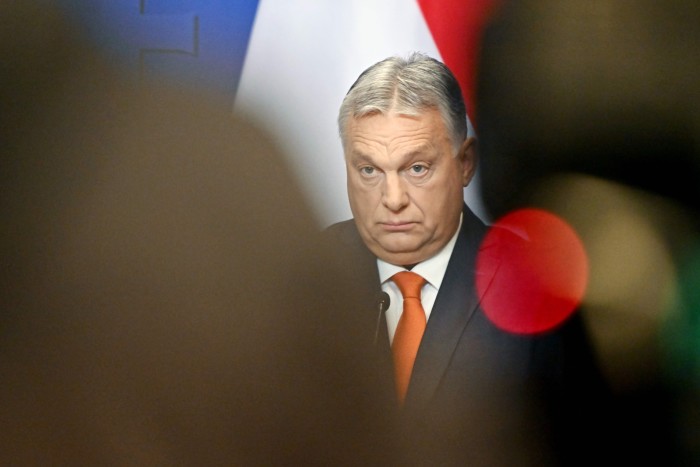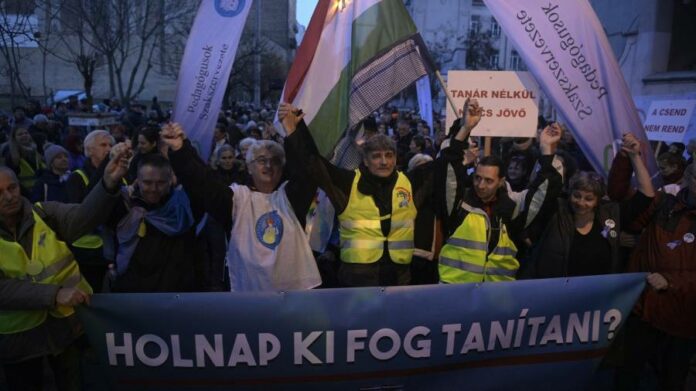With long queues at petrol pumps, teachers blocking Budapest streets in a strike over pay and small-business owners demonstrating against tax rises, Hungary’s economic woes and the resulting public anger have wrongfooted rightwing prime minister Viktor Orbán and threaten to escalate his dispute with Brussels over frozen funding.
“I take second jobs and give private classes,” said Budapest teacher Bence Tóth, who joined his profession’s year-long rolling strikes after struggling amid soaring inflation. “I work or commute or sleep. It’s unsustainable.”
Despite measures such as retail price caps introduced even before the war in Ukraine sparked an energy crisis, food and power prices in Hungary rose about 50 per cent in December compared with the previous year, according to government data. Overall inflation rose 24.5 per cent year on year on December, the highest in the EU. The bloc’s average is 10.4 per cent.
Economists pin the blame partly on a weak forint, the phaseout of price caps and a retail tax. The price caps themselves had a distorting effect, they say, causing shortages of fuel and staples such as sugar as importers and retailers declined to sell below cost, as well as leading to price rises for non-capped products as they sought to compensate for the cap on other goods. The government was last month forced to remove the fuel cap after supplies collapsed, sparking panic buying.
Lajos Török, chief analyst at Budapest brokerage Equilor, warned the picture would worsen. “Household expenses rise so domestic consumption will fall, higher financing costs will delay corporate investments, state investments will be cut back” all but erasing growth, he said.
The economic troubles will limit Orbán’s scope to pacify the public with costly populist measures, a tool he has deployed in the past, just as his Fidesz party prepares for municipal and European elections in 2024.
“Hungary’s inflation is bad news all around,” said Dániel Hegedűs of the German Marshall Fund, a US-based think-tank. The prime minister would be forced to abolish the price caps, he said, which would itself add to cost pressures for his electoral base. “This will massively impact a much wider and lower social class, which can hurt Orbán,” he added.
Public discontent is mounting. Teachers, who are seeking a wage rise of around 45 per cent and are also protesting over high workloads and central control of the education system, began another week-long strike on Monday. Wider demonstrations erupted last year over a sudden rise in small-business taxes and reduction in energy subsidies.
Although recent polls suggest Orbán, who won a fourth consecutive term last year, and Fidesz have no strong political challengers, local elections in central Hungary earlier this month hinted at potential trouble for the government.
In the town of Jászberény, opposition candidates for mayor and the city council swept the board with large majorities, beating their Fidesz rivals less than a year after the ruling party won the district easily in parliamentary elections.
Analysts said Orbán was likely to try to deflect blame for the economic squeeze, hardening his political stance ahead of next year’s elections and making him an even more difficult partner in the EU than previously.

In recent months, the Hungarian prime minister has delayed EU sanctions against Russia imposed over the war in Ukraine and held up the bloc’s financial aid for Kyiv as he sought to unlock about €30bn in EU pandemic recovery and structural funds.
Brussels has blocked the money on the grounds of a perceived risk of fraud and democratic backsliding by Budapest as Orbán extends the government’s control over the judiciary, media, arts and education.
The government this month launched an advertising campaign claiming a majority of Hungarians opposed the EU’s Russia sanctions, which Orbán has blamed for the country’s economic ills.
“This bloody sanctions regime drives inflation skyward,” Orbán told state broadcaster MR1 earlier this month. “If sanctions were to end, energy prices would drop immediately, along with general prices, meaning inflation would halve.”
He has also linked the teachers’ plight with EU intransigence, saying the government would offer a 10 per cent pay rise but could lift this to 20.8 per cent if Brussels released the Covid funds.
Orbán’s lack of economic tools “leaves him with dangerous choices”, said Hegedűs. “Cheating or repression [at next year’s elections] to retain unquestioned authority; a return to a world with a genuine opposition; or protests [that weaken the government significantly].”
Since taking power in 2010, Orbán has weathered several crises. His handling of some, such as his hardline approach during the 2015 refugee emergency, even boosted his popularity. But critics say he may have misjudged his strategy this time.
“The government has not found the keys,” Hungary’s central bank governor György Matolcsy told a parliamentary committee in December. “We cannot overcome this energy price explosion and inflation crisis in old ways.”
“Communism already showed price caps don’t work,” said Matolcsy, who Orbán once described as his “right hand” on economic planning. “That system collapsed. Let’s not return to [it] with such techniques.”
Orbán remains defiant, telling MR1 earlier this month that Hungary’s foreign exchange reserves were near a high after recent borrowing, meaning the country was solvent.
Hungary’s debt fell from 78.6 per cent of gross domestic product at the end of 2021 to 75.3 per cent at the close of last year, below the EU average of 85.1 per cent, according to EU data. In 2022, its budget deficit reached 5.3 per cent of GDP, roughly double the EU’s 2.7 per cent average.
“Hungary can get by without [the EU],” said Orbán. “Of course we do better with them . . . but to think in Brussels that the sun won’t rise without them . . . that’s completely misguided.”
Meanwhile, the Hungarian government has responded to the teachers’ protests with a crackdown, tightening strike rules, firing some for “civil disobedience” and bringing education under the control of the interior ministry.
Budapest maths teacher Tamás Palya was fired in September. He has since found work at a private school but said teachers in the state system were repressed and intimidated.
“They are under constant surveillance — what they post on social media, what they like, whether they wear chequered shirts [the uniform of the protesters],” he said. “It’s absurd. But that’s the reality.”






